PhD in Architecture Program: Meet the 2021 Graduates
September 1, 2021
Meet the 2021 graduates of the Azrieli School of Architecture & Urbanism’s PhD in Architecture program. The PhD students explore a range of media that support their investigations, including film, drawing, modeling, and mapping.
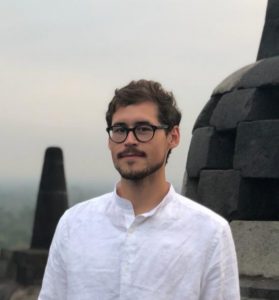
DR. JESSE RAFEIRO
Supervisor: Dr. Stephen Fai, Professor, Director Carleton Immersive Media Studio, Co-Chair PhD in Architecture program
Advisor: Dr. Claudio Sgarbi, Adjunct Professor, Azrieli School of Architecture & Urbanism
Advisor: Dr. Michael Jemtrud, Professor, The Peter Guo-hua Fu School of Architecture, McGill University
JESSE RAFEIRO defended his dissertation in August 2021. He holds a Bachelor of Architectural Studies from Carleton University and a Master of Architecture from McGill University. Over the past 11 years, he has collaborated on numerous research projects and publications involving the digital documentation, visualization, and dissemination of architectural heritage with several institutions. They include the Carleton Immersive Media Studio at Carleton University, Facility for Architectural Research in Media and Mediation at McGill University, and Instituto Superior Técnico Lisboa at the University of Lisbon.
Rafeiro’s dissertation, titled Fiction as Pedagogy: Toward a De-Anthropocentric Architectural Education, investigates fiction as a form of architectural pedagogy within the context of the Anthropocene. His research interests explore anthropocentric critiques found across philosophy, education theory, anthropology, biology, and literature studies. He focuses on the intersection of emerging discourses in post-humanist education studies and nonhuman narratology. The dissertation investigates three trajectories in literature studies as departure points: the weird realism of H.P. Lovecraft, the multispecies worlding of Donna Haraway, and the graphic portrayal of animal subjectivity in David Herman’s narratology beyond the human. It aims to promote critical approaches to education that situate nonhuman design and representation as trajectories for architectural thinking.
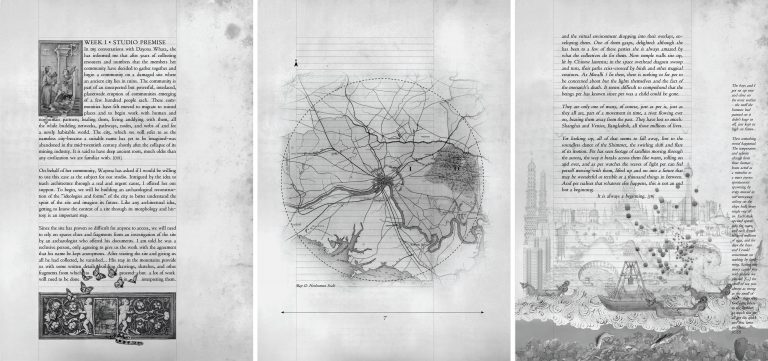
Sample pages from Rafeiro’s project – a fictional story which proposes a studio based on a “de-anthropocentric” intergenerational and multispecies world
I was interested in exploring how literature could inspire new forms of teaching that might help us to re-imagine the role of architecture in the face of the more-than-human challenge of climate change. I am passionate about this topic because I think architecture is uniquely situated to imagine how the world could be, together with proposing new models of living on a damaged planet. I think the idea that architecture is a discipline which is exclusively concerned with the support and comfort of the human species must be challenged.
– Dr. Jesse Rafeiro
Rafeiro carried out much of the dissertation’s theoretical work through teaching at Carleton, where he integrated early phases of his doctoral work into undergraduate design studios. He also initiated a new first-year design curriculum with Dr. Stephen Fai for a marionette theatre project that questioned the relationship of humans and animals in architecture. With six other instructors, they incorporated various cultural storytelling traditions through puppet making and digital animations.
Rafeiro says the doctoral program at the Azrieli School provided a diverse range of experiences and academic skills. These included teaching, research projects at the Carleton Immersive Media Studio, internship programs in Lisbon, and financial support to present his research at conferences internationally.
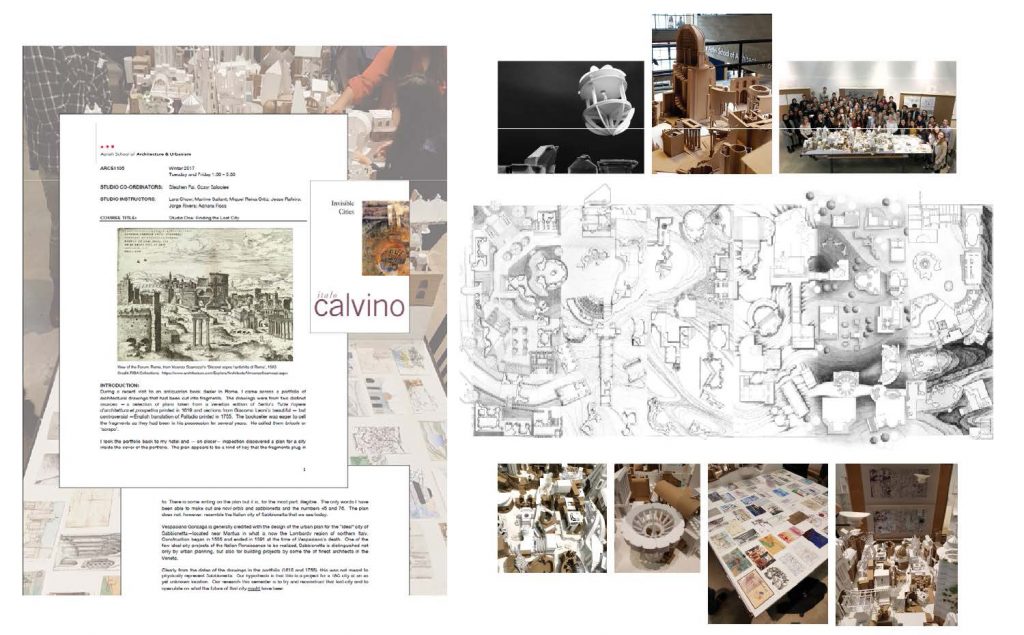
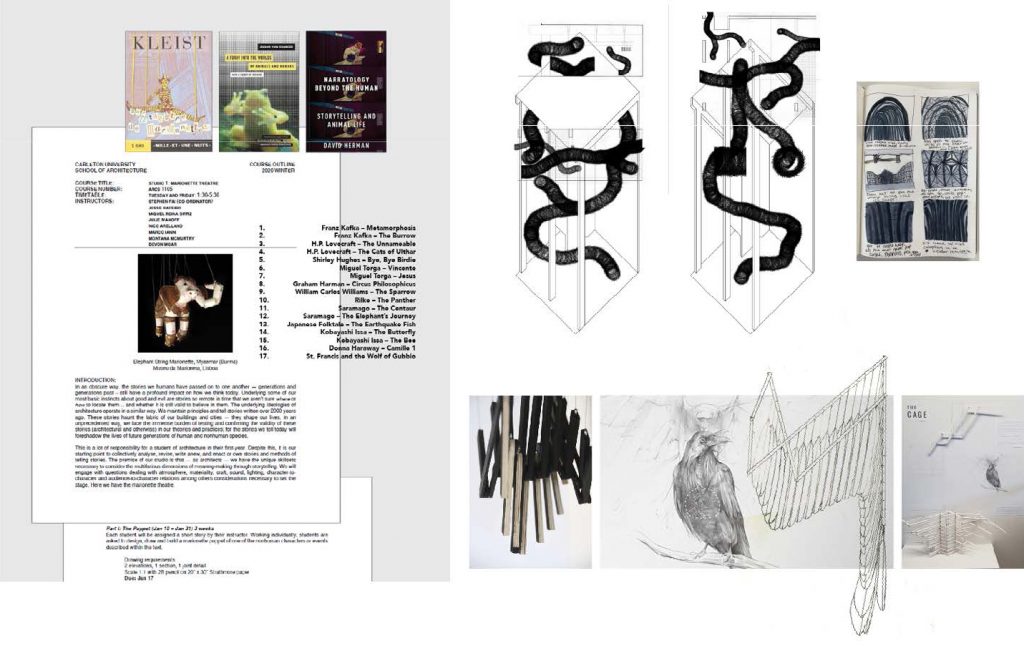
Student work from first-year undergraduate design studios that Jesse Rafeiro has taught with other PhD students.
“The program did not just support my PhD research but also provided experiences that contributed to developing a more personal teaching and research philosophy,” he says. “With these diverse experiences, I was able to transfer different types of research and teaching skills across different course types. The support of like-minded and supportive supervisors was also crucial for this.”
He is currently in Lisbon on a research venture focused on speculative digital reconstructions and storytelling of heritage buildings in Portugal. The research combines historical research with digital tools, working primarily on reconstructing convents and monasteries that have changed function across time.

DR. PALLAVI SWARANJALI
Supervisor: Dr. Federica Goffi, Professor, Co-Chair PhD in Architecture program
Advisor: Dr. Stephen Fai, Professor, Director Carleton Immersive Media Studio, Co-Chair PhD in Architecture program
Advisor: Dr. Joy Sen, Professor, Indian Institute of Technology, Kharagpur, India
PALLAVI SWARANJALI defended her dissertation in December 2020. During her doctoral studies, she became a full-time faculty member in the Bachelor of Interior Design Program at Algonquin College in Ottawa. She holds a BA in Architecture and a MA Design in Industrial Design from India, where she worked in architectural practice. She is an intern architect with the Ontario Association of Architects and a coordinator of the Carleton Research | Practice of Teaching | Collaborative (criptic.org). She is also a founding member of the Canadian Centre for Mindful Habitats (mindfulhabitats.ca).
Her dissertation is titled The Subjunctive Pause. The Nature of Architecture and its Representation in the Works of Indian Architect Balkrishna Doshi. Swaranjali conducted extensive firsthand research in Doshi’s office, where she spent an extended period working under his direct mentorship.
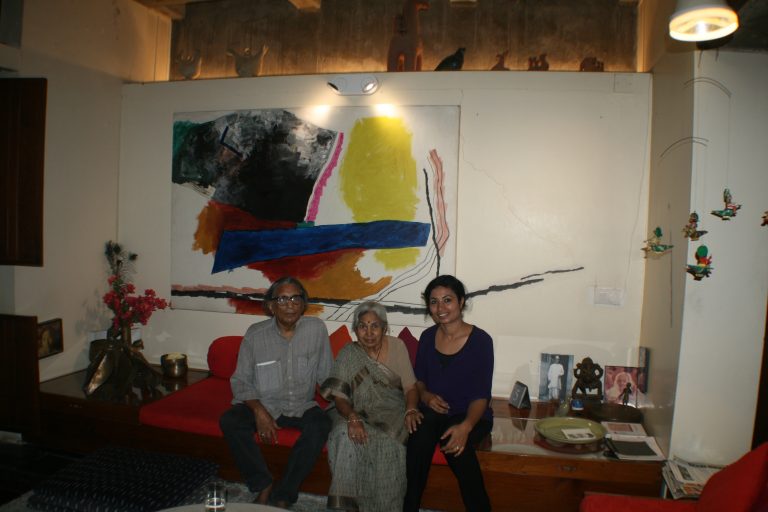
Pallavai Swaranjali with Balkrishna Doshi and his wife Kamalaben in their house, Kamala House in Ahmedabad.
After completing my master’s in Design and working in architectural practice in India, I started looking for PhD programs in North America to further my passion for research. The PhD program in the Azrieli School of Architecture& Urbanism brought together historical, theoretical, and practice- derived research and sparked my interest. I arrived in Ottawa in 2011. I met with Dr. Stephen Fai to understand the program and discuss my research interests. The PhD library was where we met, and I immediately felt at home and happy. I called Ottawa home. It has been an intense journey since, and I have benefitted from the program immensely. It has further sharpened my critical thinking and deepened my understanding of architectural practice, teaching, and research.
– Dr. Pallavi Swaranjali
The dissertation studied three modes of architectural storytelling that Doshi adopted, namely, tectonic (through his buildings), visual (through his miniature painting style illustrations), and literary (through his written stories). Doshi’s built work and its representation created a “pause”- bringing in a re-orientation to present the invisible by offering a poetic and syncretic virtual world. This “pause” solicited engagement. The dissertation argues that the “pause” was a quality of architectural conceptualization, experience, and representation that imparted to his architecture a subjunctive character. It opened a space of translation between the author (architect) and the reader (users and others involved in the architectural creation).
Swaranjali’s dissertation contributes to the knowledge of the history and theory of architecture through a rigorous, in-depth study of the work of the 2018 Pritzker Prize-winning architect. In addition, as acknowledged unanimously by the Examination Board, her oral defense was exceptional and recognized by a Senate medal nomination.
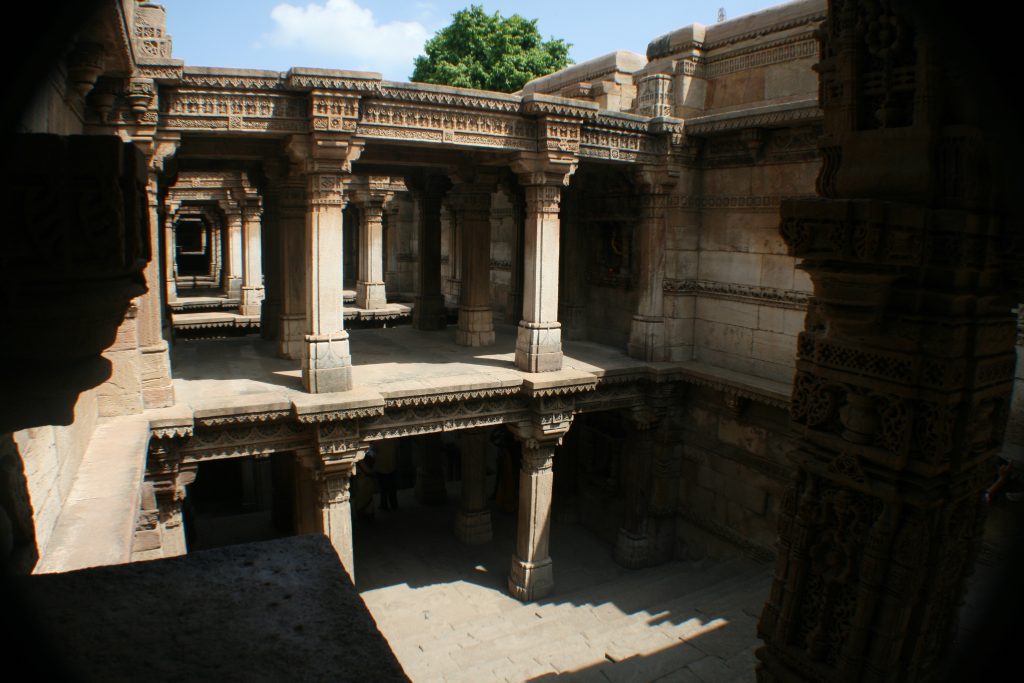
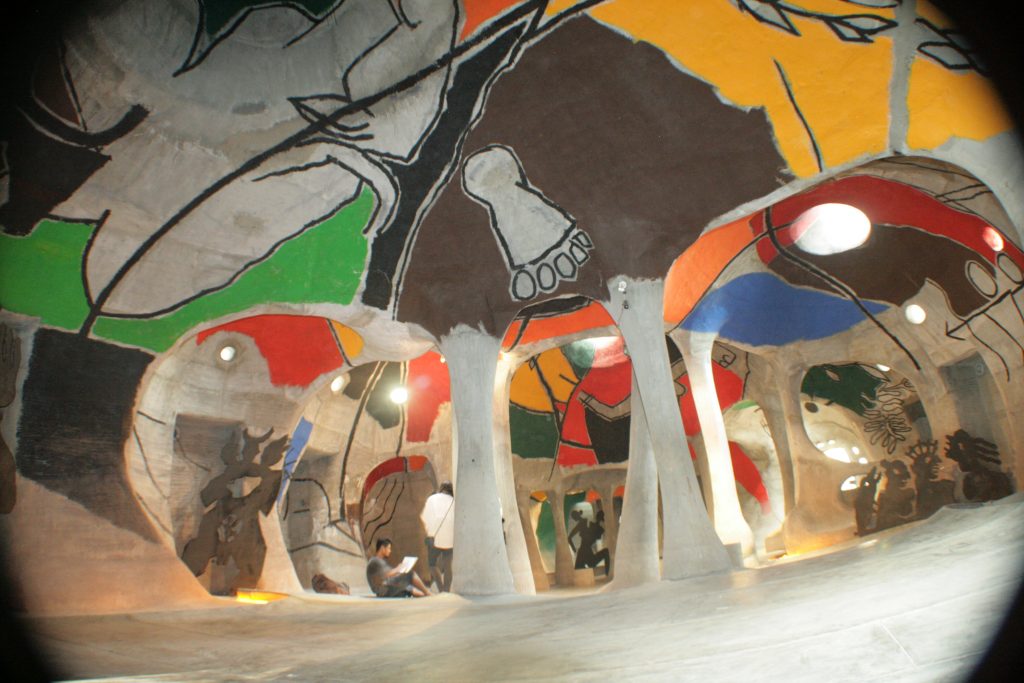
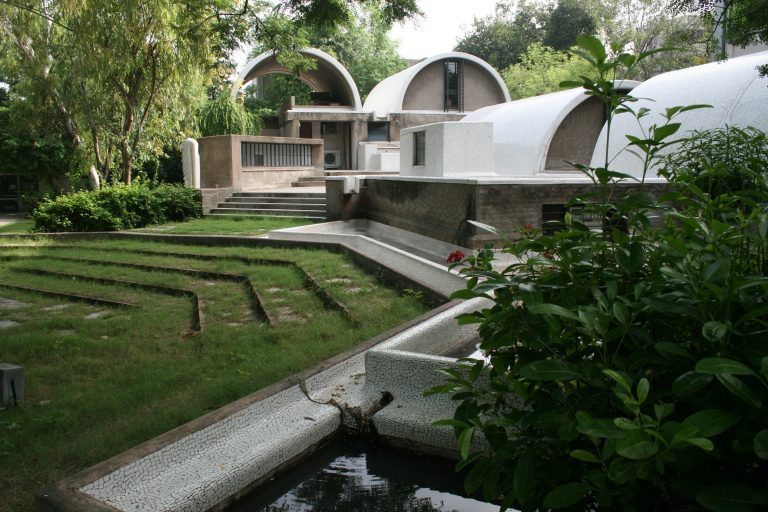
Her research was recognized with a scholarship and a three-month residency in 2015 at Montreal’s Canadian Centre for Architecture. While in the PhD program, she received scholarships and awards, including the Ontario Graduate Scholarship. Swaranjali exhibited drawings and published journal articles and book chapters. Weeks before her defense, she presented her doctoral research at an international panel discussion on Doshi’s design process and the role of storytelling in his work. The South Asia Institute in Chicago organized the event.



DR. JORGE RIVERA GUTIERREZ
Supervisor: Dr. Federica Goffi, Professor, Co-Chair PhD in Architecture program
Advisor: Dr. Stephen Fai, Professor, Director Carleton Immersive Media Studio, Co-Chair PhD in Architecture program
Advisor: Alberto Perez-Gomez, Saidye Rosner Bronfman Professor, Peter Guo-hua Fu School of Architecture, McGill University
Advisor: Marc Furstenau, Associate Professor, Film Studies Program Director, Carleton University
JORGE RIVERA GUTIERREZ defended his dissertation in December 2020 and graduated in February 2021. Gutierrez is an architect working in the design-build and videography fields. He began his doctoral studies in 2016 at the Azrieli School of Architecture & Urbanism at Carleton University. In 2007, he graduated from the Architectural History and Theory master’s program at McGill University.
His Guadalajara-based office, Departamento de Arquitectura, has developed a design-build practice in collaboration with local craftspeople. With his brothers, Gutierrez has made short films, video documents, and video installations. His first video installation debuted at the 2016 Venice Biennale of Architecture at the Pavilion of Mexico. He is interested in the intersection of narrative, memory, time, and architecture. His research focuses on exploring the capacity of film to convey the experience of place, and in turn, a means to inform architectural thought and imagination.
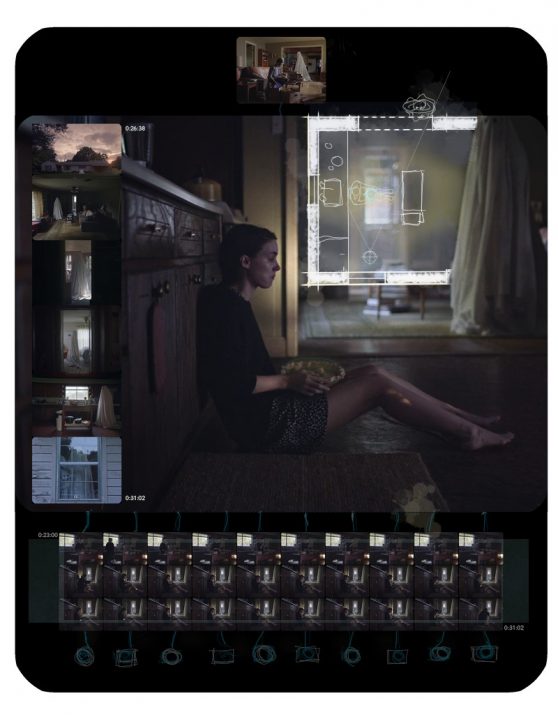
The exterminating angle. The house, the thresholds and rituals. Drawing by the author.
Gutierrez’s dissertation is titled The Affective Threshold; or The Sensational Account of Place Through Film. It sits at the intersection of architecture and film studies and is written from an architectural point of view. It is particularly about lived space and the concept of home. He studied these architectural concepts via slow cinema and the cinematic representations of inhabited spaces in people’s homes.
The dissertation is concerned with how filmmaking uses architectural atmospheres to frame a story and allow its characters to unfold fully in these emotional spaces, asking what architects may learn from the portrayal of architecture as a stage for fiction.
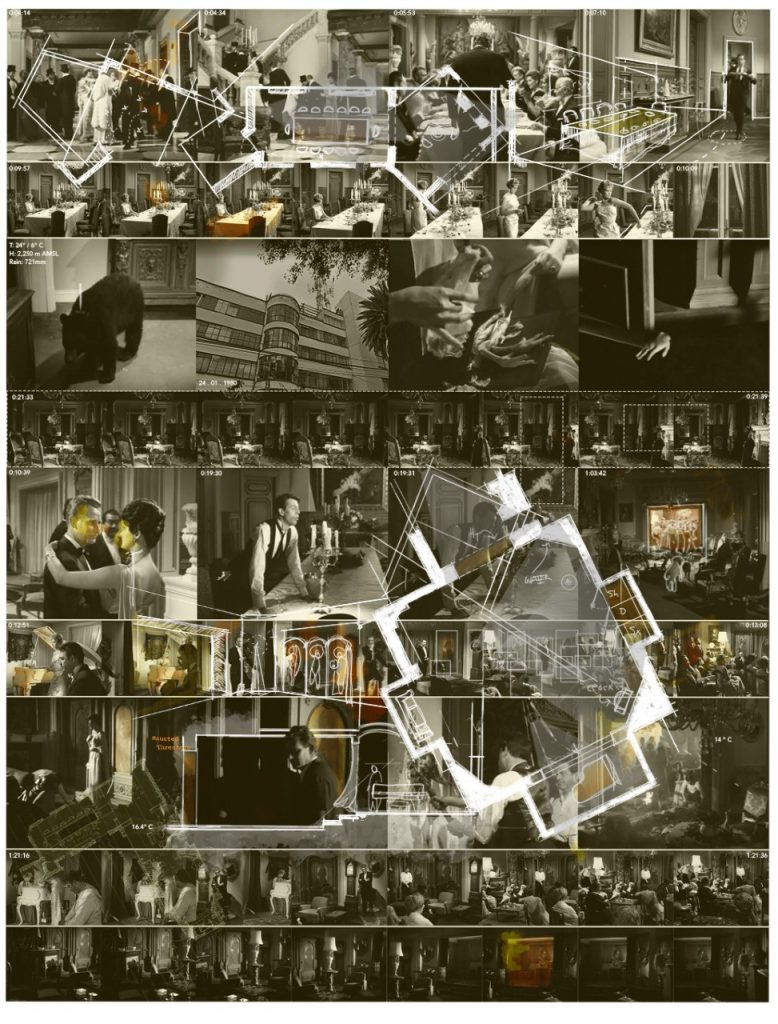
The ghosts in the veranda. The house of Boonmee.
Drawing by the author.

The pie and the ghost.
Drawing by the author.
The research deploys film hermeneutics, atmosphere theory, and phenomenology to propose that film is not only a visual medium but a conveyor of rich, haptic experiences. As such, it bears the capacity to speak to us about the poetic, emotional, and experiential richness of place and architectural atmospheres. Two key elements support this argument. First, a specific style of filmmaking — the school of slow cinema and the cinematic long take, as a way of engaging our emotions into the spatial experiences offered by film. Second, the house as a location, mainly as a place for grief and emotional reconstitution.
Gutierrez moved from Mexico to do his PhD at Carleton. He also traveled to Thailand for his research. He continued to practice throughout his doctoral research. His research was recognized by a four-year Ontario Trillium Scholarship and was presented in symposia and conferences.
External Examiner Dr. Gul Kacmaz Erk, of Queen’s University in Belfast, noted that Gutierrez made an excellent defense and contribution to architecture theory through a well-researched and thought-provoking dissertation.
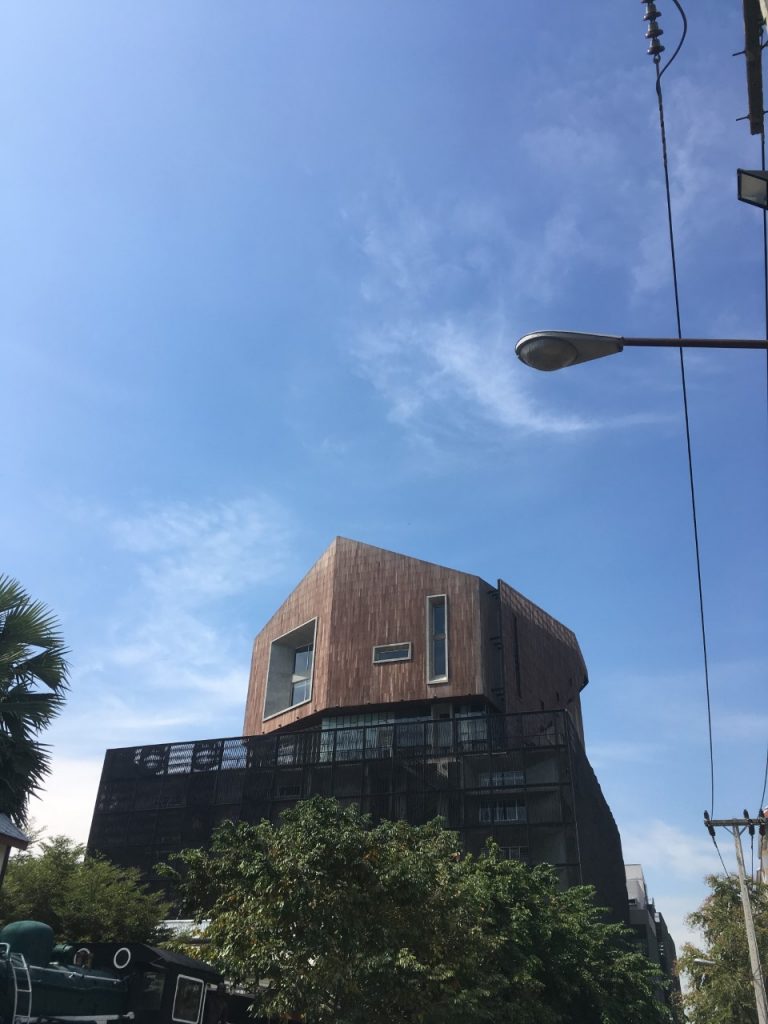
About the PhD in Architecture
The PhD in Architecture program at the Azrieli School of Architecture & Urbanism is an innovative, comprehensive doctoral program that fuses research with critical practice in architecture through the combined exploration of a dissertation and an epistemic object, which is uniquely defined in relation to the research.
The program’s exceptionally talented and thoughtful students undertake original, speculative, and experimental research. Doctoral projects draw on the interrelated reflective aspects of architecture, design, and material processes. The PhD rigorously prepares graduates for academic and professional fields.
The PhD Program in architecture helps form reflective practitioners and critical thinkers who will contribute to both practice and academia, challenging current and dominant understandings of architecture practice and pedagogy and contributing to the renewal of architectural knowledge.